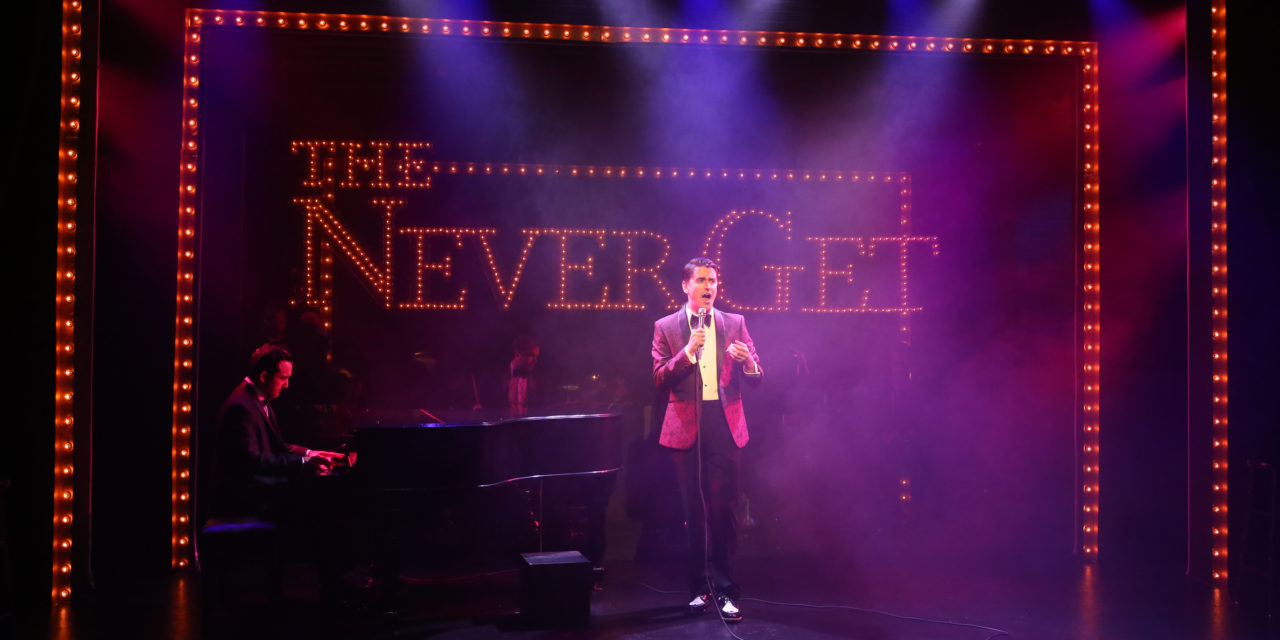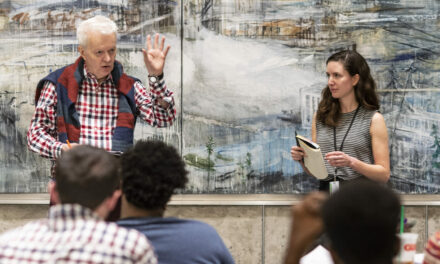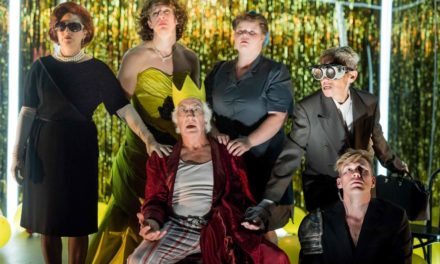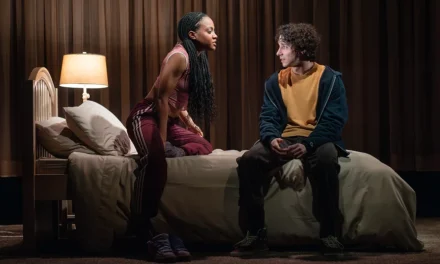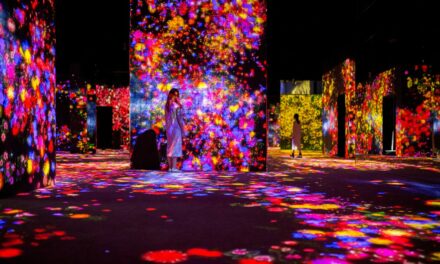Mark Sonnenblick is a composer, lyricist, and scriptwriter. His latest collaboration is Midnight At The Never Get which recently opened at The York Theatre Company. The theme of this musical is what first caught my attention. I then had the opportunity to see and hear a sample performance of the piece. It was then that I discovered not only is the bittersweet story very imaginative, but the music is pleasantly comparable to the genre considered the Great American Songbook. Midnight delivers the two crucial elements necessary for engaging musical theatre.
Mark began making music as a youngster growing up in the suburbs of Los Angeles. His appreciation for music began with piano playing and then evolved into songwriting. In High School, he formed a band called Virgins With Rifles; they played for rockfests while he also played with the school jazz band. It was through the jazz band playing that he was exposed to more styles of music. Mark sort of fell into musical theatre at the direction of his high school music teacher. His exposure to the American Songbook came while performing standards of bygone eras at events such as retirement homes. His drama teacher then introduced him to the golden age of musical theatre. He was still writing rock songs during this period but was gaining an interest in musical theatre. In his senior year, he collaborated with his English teacher and several of his fellow classmates to pen his first musical. While in college his major was philosophy, he began acting in the theatre and by his sophomore year, he had written another show. During those college years, he began writing more and acting less. After college, he moved to Denver, but uncertain of his direction while there, he formed a synth-rock band. Mark loved theatre and would frequently travel to New York City and cram in a lot of shows and that’s when he really caught the Musical Theatre bug. He landed in New York in 2014 and embarked on a career of writing musicals. Storytelling inspires him as a composer. Mark embraces the challenge of how to make music help to move a story along. I joined Mark at The York Theatre to further explore his work.
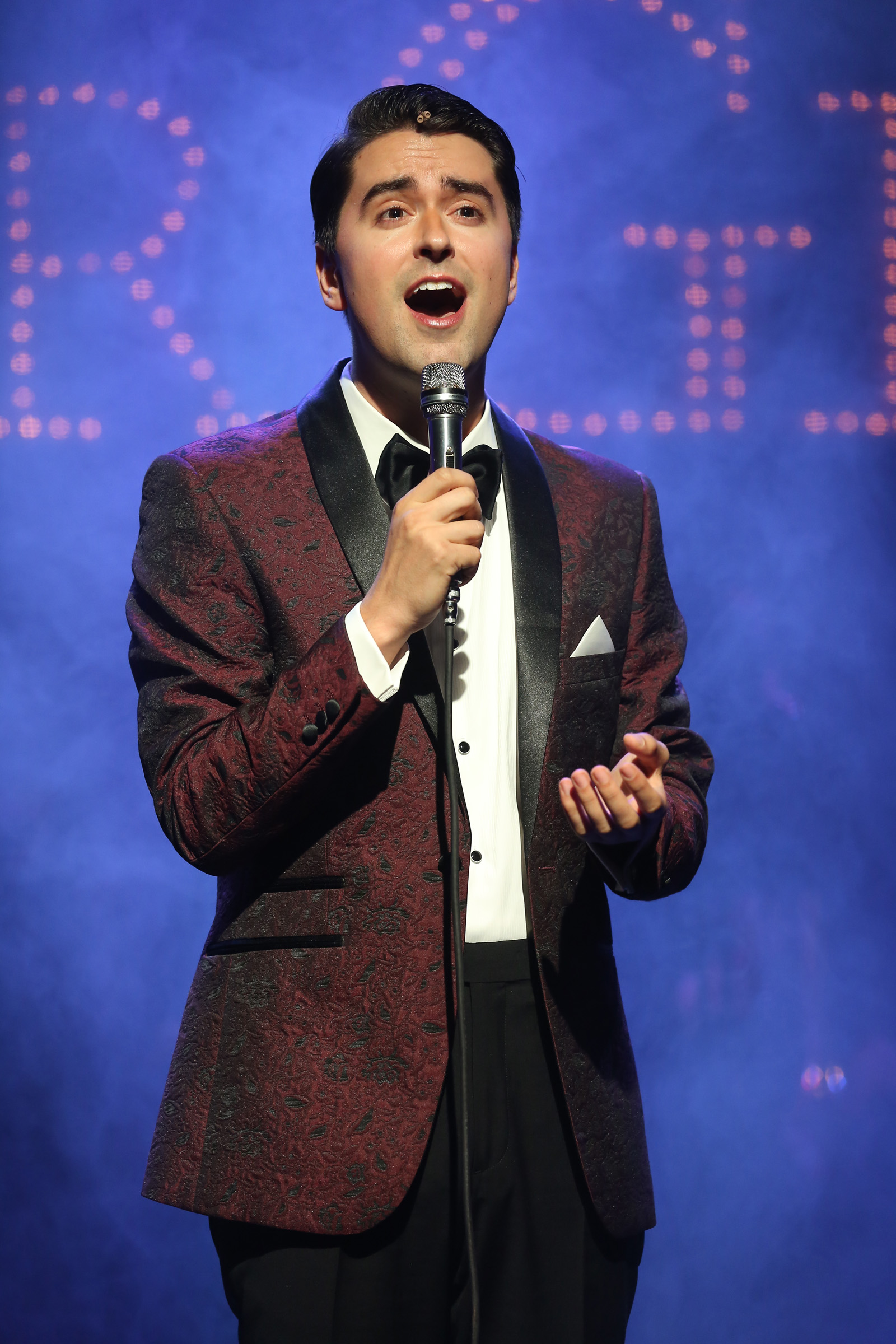
Pictured: Sam Bolen. Photo Credit: Carol Rosegg.
DV: What are your feelings about Modern Musical Theatre today, especially for young composers like yourself?
MS: I feel pretty lucky to be writing musical theatre right now in a way that I don’t know if even five years ago I would’ve felt as lucky. I think that when you decide you want to enter musical theatre you understand that you probably are not going to be making a lot of money for a long time. It’s strange but like a lot of creative industries and the route to making money is very difficult, but I think that when I first started I was going to need to figure out other ways to support myself. I love musical theatre, and people in New York love musical theatre. But it’s not like the movies where everyone goes. However, in the last couple of years, this has really changed. Musicals now are more considered a national culture. Shows like Hamilton and Glee have created excitement again. The amount of support there is for musical theatre can sometimes feel like it’s not huge that just the fact of doing a workshop, being in production, or getting a grant feels lucky. The resources still feel pretty scarce but when you take a step back and think about how art is supported in this country, I think musical theatre has a much more kind of support infrastructure than a lot of other art forms. Just by being around it I have gained access to more resources. I also feel very lucky because the musical theatre community is really amazing. Nobody who decides to write and produce musical theatre does it for the money. It’s not to say that money doesn’t factor into musical theatre and of course it does on a commercial level. But unlike many other industries money is not the driving force in regards to decisions that get made. Because of this, a community is created that is dedicated to supporting one another and the goal of creating something exciting through a real comradery.
DV: Is Midnight At The Never Get somehow inspired by any personal experiences?
MS: It does draw on personal experiences in the sense of what it feels like to be in love and have your heart broke. It’s not just musically, but anytime that I’m writing something one part of the way I am able to understand how a character is feeling is through the point of view through a song. I have to filter that element through what is true and right to me. Aside from the broader things about love and exploring a relationship I think a lot of this story came from reading and talking to people and getting a sense of what the music is going to sound like in a very clear sense of the world. Initially, it was Sam Bolen and me on stage with just a piano and we knew that we could do that as a performance. Having those limitations made us realize there’s two of us onstage, one of us is telling a story that is looking back on a relationship and so what’s that going to mean for the storytelling? How does that narrative get communicated? I think that’s where a lot of those framing devices came from in delivering the actual contours of the writing derived from those limitations.
DV: Which flowed most easily for you with this piece the composing of the music or the writing of the story?
MS: Definitely the composing of the music. The story at least for me is very hard to figure out while constantly adjusting and trying to make it clearer while making sure the framework of the show communicates what it needs to communicate.
DV: Your songs in the show hold the potential to stand completely on their own.
MS: Well that was what was so fun about this. Once Sam had come to me with the idea for the show what I found to be really fun was imagining I’m writing fictional songs for a fictional songwriter. I got to create the character’s body of work but also every song needed to stand on its own while being the right storytelling moment for the show. In general, this is the kind of writing I had not really done before in regards to the style of music. The songs needed to be written as though they would work entirely separate from the show and yet serve as an echo based on the character’s story. But musically the songs were easy because the form and style was pretty clear. The restrictions of working within the story generally led to interesting things. I like having those restrictions so then I know the playground in which I can work and be hopeful that we’ll work out ways to surprise people, especially with songs such as these. Most but not everyone just know the Great American Songbook up to an extent and what it sounds like.
DV: How would you say the stories of the main characters might compare to the current climate of the struggles within the LGBT community today?
MS: I’m always a bit hesitant to say anything too definitively in part because the LGBT community is so broad. My experience being a member of that community in New York is radically different, even in just a certain section of New York City is very different than other people’s and particularly the world over. If America has come tremendously far in some ways or parts of America have come that far it’s certainly not the case in other parts of America and the world over which is absolutely not the case. I think at least for me with the writing of this show certainly I want people to come and respond to it and take from it whatever they will. I think the thing that resonates most for me is that the circumstances the show hopefully raises are the fundamental questions that I think for not just people in the LGBT community to deal with but anybody who thinks about what it means to construct an identity or to have to live in a world where society wants you to be one thing through cultural or legal pressures that denies a fundamental part of who you are. Obviously being gay in the sixties is a time where that was the case.
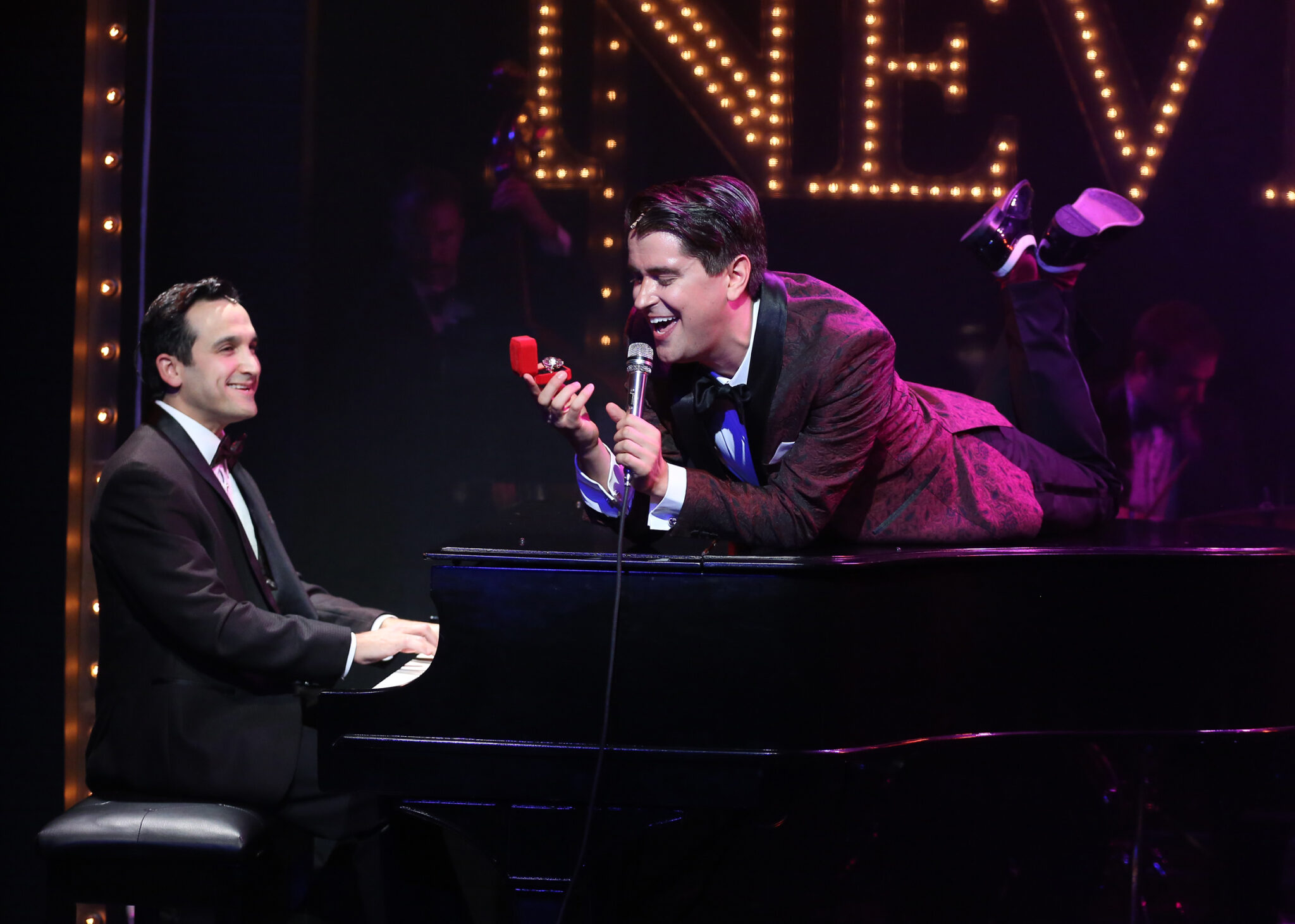
Pictured: (Left to Right) Jeremy Cohen and Sam Bolen. Photo Credit: Carol Rosegg.
The pianist, Jeremy Cohen, came in and auditioned for this run at The York Theatre, and he blew us away. He’s an absolutely incredible piano player and a fantastic actor. He and Sam have this great chemistry that’s been so fun to watch as the show came to life with the two of them. Having originated the performance role of the pianist I was not able to actually step back and view the show. Jeremy stepped into the role and learned the score and he plays it beautifully and he’s a phenomenal actor too.
DV: Which came first, the story or the songs?
MS: Before the story came into a really clear focus we sort of knew the overall but vague plot. But I wrote a bunch of songs and then with the shows Director Max Friedman, who is incredible and was there, pretty much since the beginning we just started getting into a room. I’d bring material that we’d work through. The very first iteration of the show was mostly music with a couple of monologues setting up the songs to tell the story. It was definitely a workshop within the world of the characters. As we had the opportunities to do more productions of it we’d swap out the songs that didn’t fit the story. As the story became clearer, I’d write more specific songs. A bunch of musical material started it, but as the story became clearer the story took priority.
DV: What is your creative process, regimen or method?
MS: I’m not strict, I’m a slow writer and so I know that I need to give myself a lot of time, I know that I have to block off time for projects. My work is best when I can dedicate my time solely to one thing at a time. I take time to brainstorm and stew and give myself the time it takes to write a song. But I just don’t write very quickly. I don’t just wake up at ten and plan on lunch at noon. I tend to write at night staying up very late. In the wee small hours of the morning, that’s the time I tend to write the most. It’s helpful when I can just write for six hours while the world is quiet without people calling, texting, or sending e-mails.
DV: What can future audiences expect from Mark Sonnenblick?
MS: I’m working on other shows but got really lucky with Midnight At The Never Get. This show has taken three years to get where it is now which is really fast. My hope is that Midnight will generate more resources for me to develop more shows more musicals, singing, and dancing.
DV: Finally one last question. How did you arrive at the title Midnight At The Never Get?
MS: The original title was Midnight At The Rialto. Then I didn’t know that Rialto was also a name for Broadway. We knew that the show takes place in this sort of cabaret club and we were trying to think of a title that would evoke that sort of mystery, era and esthetic, so midnight seemed good for that but Max Friedman our director said Midnight At The Rialto was a terrible title for this club because Rialto has no character. Friedman pushed us to come up with a better title more specific to the story. I’d been researching about the period of the show as well as cabaret and gay rights. In the book, Stonewall, the author talks about a lot of these old clubs and there was one called “the Tenth of Always” which was a safe haven restaurant that was open late where a younger gay crowd could go and hang out at. I thought that was an amazing name for a place, and I wanted a title something like that. So Midnight At The Never Get is my version of The Tenth Of Always. Midnight At The Never Get also takes on more resonance throughout the show as it goes, and that’s where it came from.
Midnight At The Never Get plays through November 4th at The York Theatre Company.
This post was written by the author in their personal capacity.The opinions expressed in this article are the author’s own and do not reflect the view of The Theatre Times, their staff or collaborators.
This post was written by David Vernon.
The views expressed here belong to the author and do not necessarily reflect our views and opinions.

